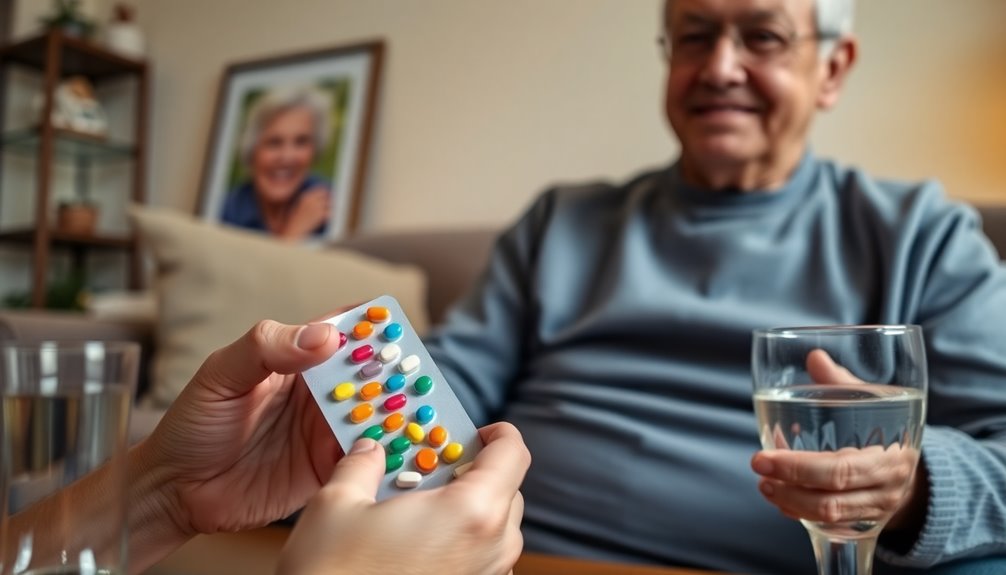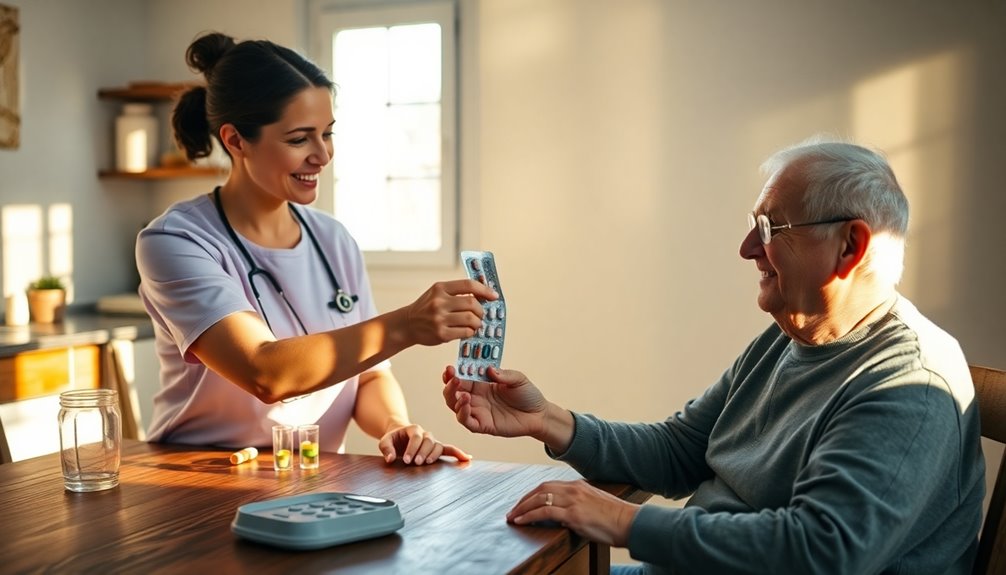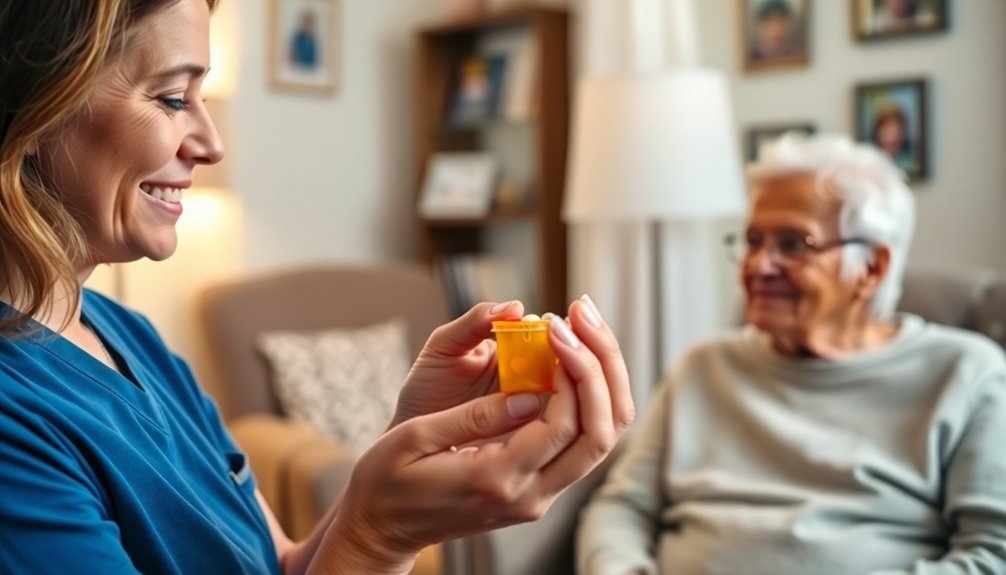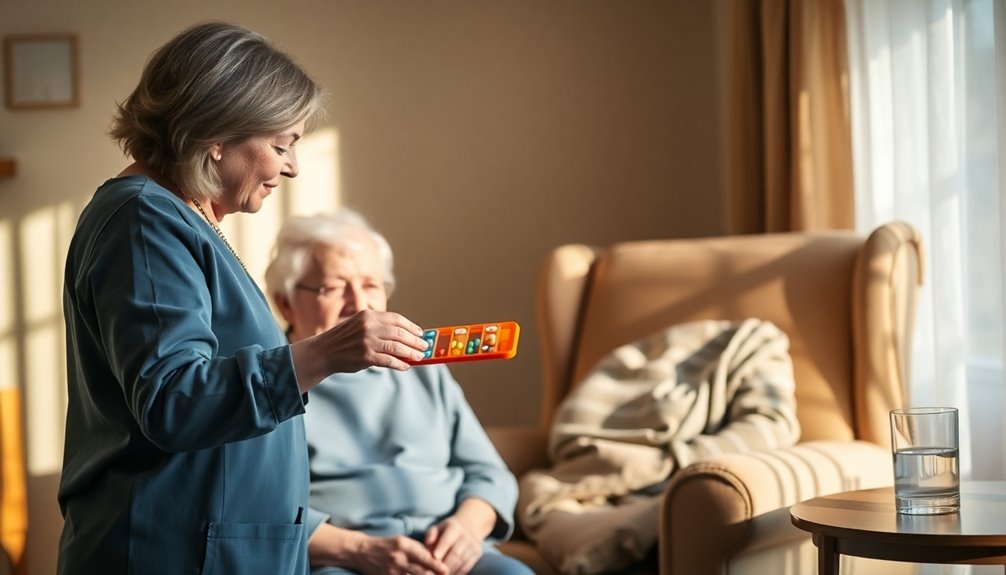Caregivers play an important role in medication management but can't administer or handle medications directly. They can provide medication reminders and help you understand your medications, including side effects and treatment plans. It's crucial for caregivers to stay within legal boundaries to guarantee safety for both you and them. Effective communication and trust between you and your caregiver can enhance your adherence to medication schedules. There's much more to explore about how caregivers can support you effectively.
Key Takeaways
- Caregivers cannot administer medications or transfer them between containers due to legal boundaries.
- They can provide medication reminders to support adherence and prevent missed doses.
- Caregivers must report any medication-related concerns to healthcare professionals.
- Filling medication organizers should only be done by licensed professionals.
- Understanding legal boundaries ensures safety for both caregivers and clients in medication management.
Understanding the Role of Caregivers in Medication Management

While caregivers can't administer medications, they play an essential role in helping clients manage their medication routines.
They provide important support by setting up routine medication reminders, which can greatly reduce missed doses, especially for elderly clients. Caregivers help clients understand their medications, including potential side effects and treatment plans, fostering independence and encouraging adherence to prescribed schedules.
It's critical for caregivers to communicate effectively with health care providers, reporting any concerns or changes in the client's condition. This guarantees accurate documentation and helps maintain a safe medication management process.
Legal Boundaries for Caregivers

Understanding the legal boundaries for caregivers is essential to confirm both client safety and compliance with medication management.
Caregivers often play an important role in supporting clients with their medications, but it's imperative to recognize that they aren't licensed for medication administration. This means you can't directly give medications or handle them between containers.
You can, however, provide a medication reminder to help clients stay on track. Also, filling medication organizers like Mediasets requires licensed professionals, so stick to your role.
If you notice any medication-related concerns, promptly report them to healthcare professionals instead of offering medical advice.
Adhering to these legal boundaries guarantees proper administration and safeguards both you and your clients.
The Importance of Medication Adherence

Medication adherence is essential for older adults, as failing to follow prescribed regimens can lead to serious health complications. Caregivers play a significant role in managing medications and supporting loved ones to guarantee they stick to their treatment plans. When medication adherence slips, the consequences can be dire.
| Reasons for Non-Adherence | Potential Consequences |
|---|---|
| Forgetfulness | Worsening health |
| Emotional factors | Increased healthcare costs |
| Prioritizing other tasks | Higher risk of hospitalization |
| Lack of communication | Unaddressed side effects |
| Insufficient education | Reduced independence |
Strategies for Effective Medication Reminders

Caregivers can take practical steps to guarantee that clients adhere to their medication regimens. Establishing a consistent medication schedule is essential. Use verbal reminders or written notes to prompt clients at the right times. These reminders can greatly reduce missed doses, especially for those managing chronic conditions.
Technology can also enhance adherence; consider using medication reminder apps to help clients track their medications independently. Empowering clients with knowledge about their medications, including side effects and treatment plans, fosters independence and encourages adherence.
Regularly check in with clients to discuss their medication schedules and address any concerns. By implementing these strategies, caregivers can play an important role in supporting clients' health and well-being.
Communicating With Healthcare Providers

How can effective communication with healthcare providers improve your client's medication management?
As a caregiver, staying in touch with healthcare professionals is essential for ensuring your client's safety and adherence to the medications prescribed.
Here are some key aspects to take into account:
- Share any concerns about side effects or adherence issues.
- Document and organize medication schedules for better care coordination.
- Stay informed about potential drug interactions.
- Relay client feedback on medication experiences.
Supporting Client Independence in Medication Management

While managing medications can be intimidating for many clients, fostering their independence in this area is essential. You can empower clients by educating them about their medications, including their purpose, dosage, and potential side effects. This knowledge helps clients feel a sense of ownership over their care plans.
Establishing a consistent medication reminder system—like verbal prompts or written notes—can help manage adherence and reduce missed doses. Encourage clients to actively participate in their medication management, which boosts their confidence and independence.
Support them in maintaining medication records so they can track prescriptions and discuss concerns with healthcare providers. Open communication about medication experiences strengthens adherence and enhances overall health outcomes, further promoting their independence. Additionally, understanding the role of emotional regulation can help clients manage any anxiety related to medication adherence.
Best Practices for Safe Medication Handling

When it comes to safe medication handling, understanding the legal boundaries is vital.
You'll also want to use effective communication strategies to guarantee your clients feel informed and supported.
Legal Boundaries Explained
Understanding the legal boundaries surrounding medication handling is essential for caregivers to guarantee safety and compliance.
As a care provider, it's vital to know what you can and can't do regarding medication management. Here are some key points to keep in mind:
- You can assist clients by reminding them to take medications.
- You can't administer, transfer, or adjust dosages of medications.
- Filling medication organizers is prohibited under legal guidelines.
- Maintain clear communication with healthcare professionals about any concerns.
Effective Communication Strategies
How can caregivers guarantee safe medication handling while maintaining effective communication with clients and healthcare providers?
First, you should document medication schedules and any changes in your client's health. This practice assures accurate communication with healthcare professionals and helps identify medication issues promptly.
Engaging in open dialogue with your clients about their medications fosters trust and encourages them to voice concerns or questions regarding their treatment plans.
Additionally, utilizing technology like medication reminder apps can enhance your communication efforts, helping clients adhere to their schedules.
Remember, effective communication is crucial in reporting any side effects you observe.
Medication Organization Techniques
Effective communication lays the groundwork for safe medication management, and organizing medications plays an essential role in that process.
You can use these techniques to enhance medication organization and guarantee the correct medication is taken:
- Utilize pill boxes or blister packs for regular medication scheduling.
- Clearly label compartments with days and times to avoid confusion.
- Regularly verify medication expiration dates and schedule timely refills.
- Be aware of potential drug interactions; consult healthcare professionals as needed.
These practices help build a solid foundation for safe medication handling.
By staying organized, you enhance adherence to prescribed schedules and minimize risks associated with medication administration.
Building Trusting Relationships With Clients

Building a trusting relationship with clients is essential, as it greatly enhances their emotional well-being and overall health. When you prioritize compatibility during the selection process, you foster a trusted relationship that allows for effective communication.
Your strong interpersonal skills will help you develop rapport, making it easier for clients to share their needs and concerns about medication management. This openness leads to better adherence and improved health outcomes.
Trust can also minimize anxiety and fear surrounding medication, promoting a sense of security and independence in your clients. By nurturing this connection, you not only support their emotional well-being but also guarantee they feel confident in your caregiving abilities, ultimately enhancing their quality of life.
Frequently Asked Questions
What Should a Caregiver Not Do?
As a caregiver, you shouldn't administer medications directly to clients or transfer them between containers.
It's important you avoid filling medication organizers, as this requires specialized knowledge.
Don't provide any medical advice regarding medications, including side effects or interactions; that's best left to healthcare professionals.
Also, remember to report any medication issues, like missed doses or adverse reactions, to the appropriate healthcare provider, since you can't manage these situations yourself.
Can a Caregiver Give a Patient Medication?
Think of a caregiver like a lighthouse guiding a ship safely to shore.
When it comes to giving medication, you can't administer it directly, but you play an essential role. You can remind patients to take their meds on time and support them in organizing their medication schedule.
Your communication with healthcare professionals about any concerns is critical, ensuring the patient's safety. Empowering them to manage their health is your most important task.
Are Carers Allowed to Give Medication?
When it comes to whether carers are allowed to give medication, it's important to know they're generally not permitted to administer medications directly.
Instead, you can assist clients by reminding them to take their prescribed medications on time.
You also play a crucial role in monitoring their adherence and reporting any concerns to healthcare professionals.
Encouraging clients to manage their own medications, with your support, helps promote their independence and adherence to treatment plans.
What Are Caregivers Allowed to Do?
As a caregiver, you can remind clients to take their medications and help establish routines for their schedules.
You're not allowed to administer medications or handle them in any way that transfers them between containers.
It's important to communicate any medication concerns to healthcare professionals.
Conclusion
As you navigate the complexities of medication management, remember that your role as a caregiver is vital. You hold the key to ensuring that your clients adhere to their medication regimens safely and effectively. But what happens when you encounter unexpected challenges? Will you be prepared to act? By building trust, communicating openly with healthcare providers, and employing effective strategies, you can not only support your clients but also empower them to take charge of their health—unlocking a brighter future together.









